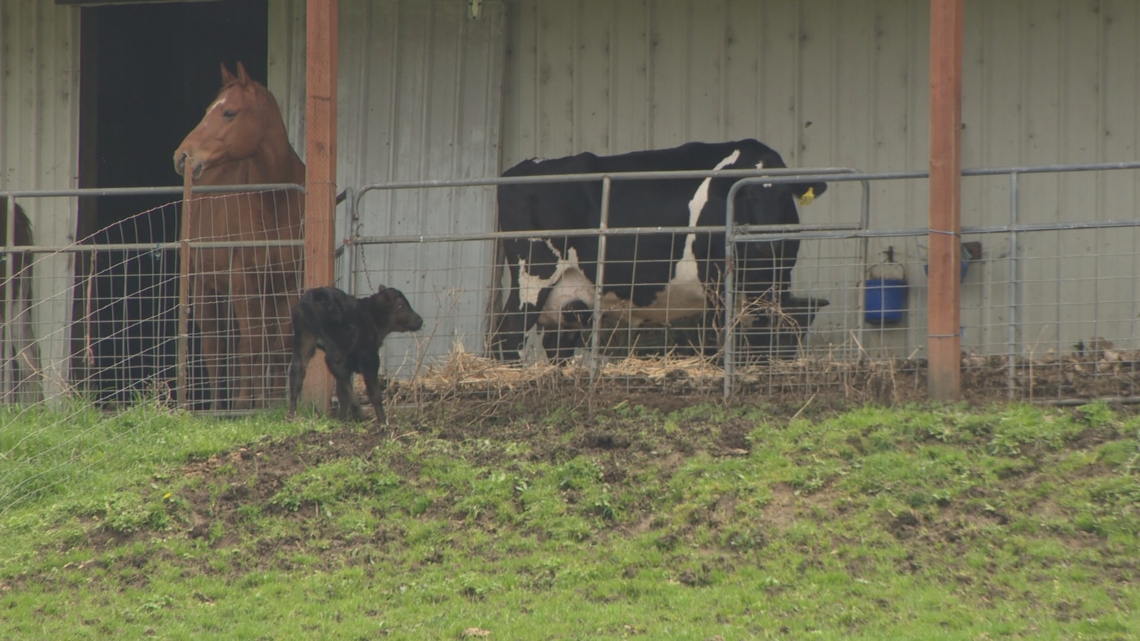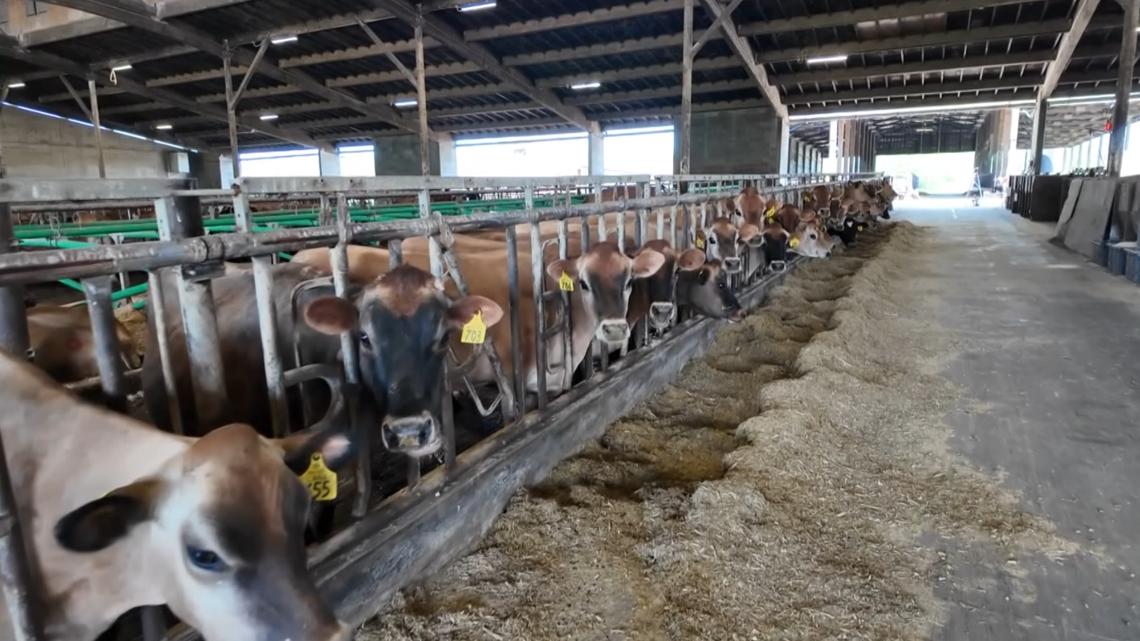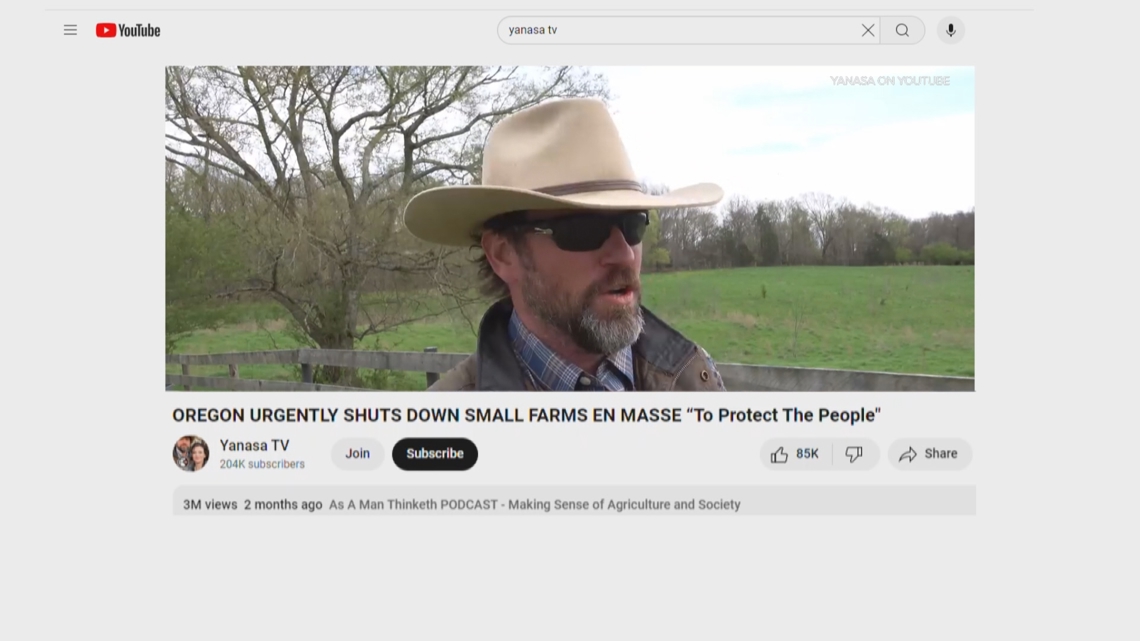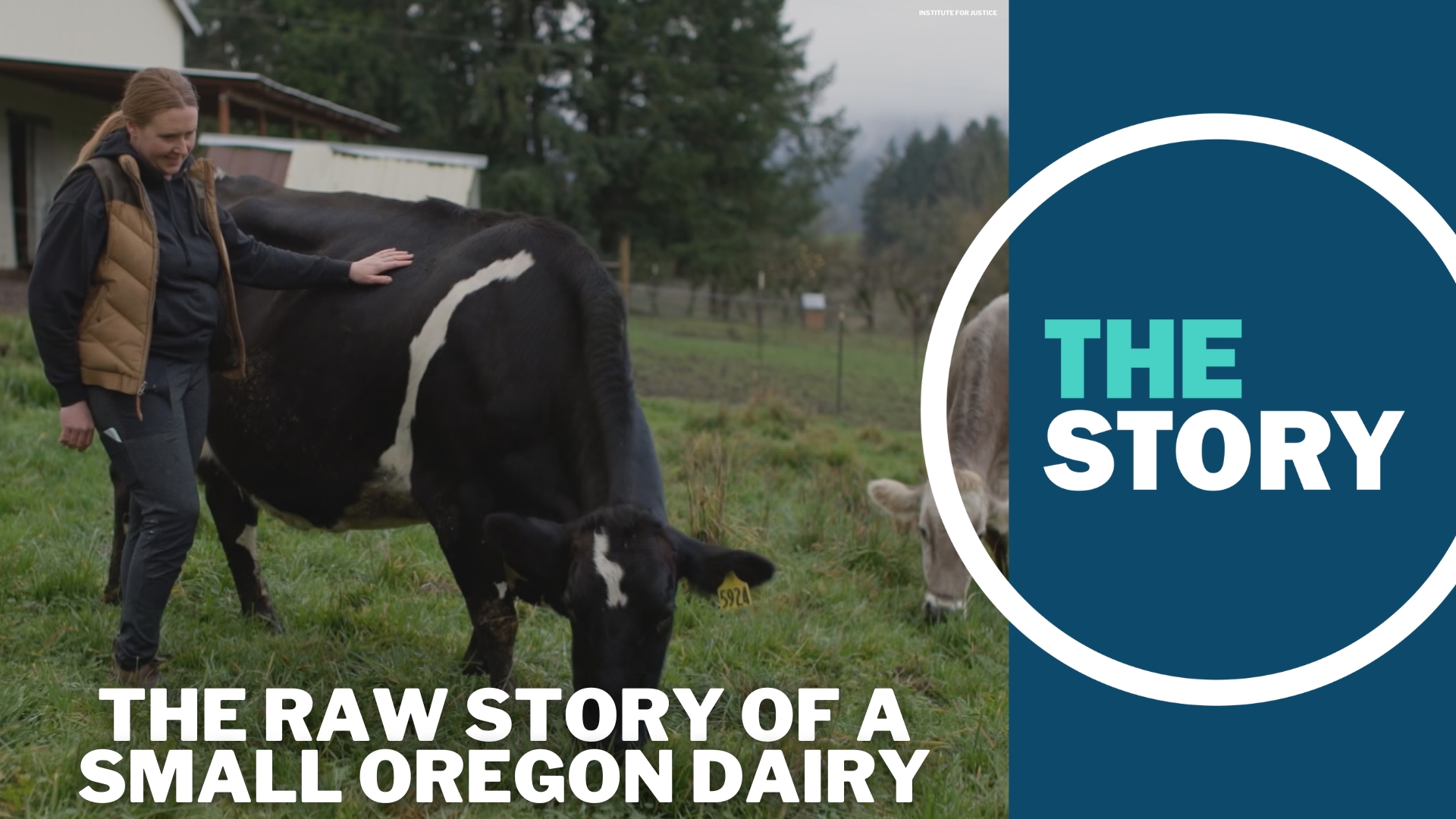NEWBERG, Ore. — In rural Yamhill County, just outside of Newberg, a tiny dairy farm has found itself squeezed between state regulators and a wellspring of misinformation — making the farmer the face of a political campaign that she says she does not entirely agree with.
Sarah King is the owner of Godspeed Hollow, a dairy with just three cows; although, it recently became home to a fourth.
"Miss Raya delivered a beautiful baby heifer for us this morning," King said, introducing her proud mother cow. "Well, I think it was this morning — I didn't get to see it. So, you know, they don't like to make a scene out of it, luckily."
King's pasture covers 11 acres. Her cows mostly roam around outside and leave their waste on the ground, where it becomes fertilizer for the soil.
And her dairy is a small business: she sells raw milk directly to members who pay to own a share of her "herd," and thus are entitled to some of the milk. It's a workaround to stay on the right side of Oregon law, which prohibits selling raw milk at retail markets.
For years, tiny dairies like King's were largely ignored when it came to rules about handling the waste from their animals. State regulators instead focused on larger operations, some of which raise thousands of cows.
But that changed in January of 2023. The Oregon Department of Agriculture issued two white papers declaring that even the smallest of dairies should have to follow the same rules around waste as large operations.
The change shocked King and others like her. To comply, she would need to pay for permits, install drain lines and holding tanks, and frequently journal how she was handling the animal waste.
"It could have been anywhere between $15,000 all the way easily up to $100,000 or more, depending on the level of infrastructure that they're going to require from us," King said. "So, it's not insignificant. I mean, and I don't care who you are, $15,000 is a lot of money ... And if I think about even a small household that's not selling any raw milk, they're just milking their backyard goat for their own family, that's a really unreasonable ask for them."


Sharing the burden of Big Cow
So, why was the change made? One hint comes at the front page of Oregon's white paper on the subject. It notes that the Oregon Department of Agriculture "has received concerns from the Oregon dairy industry that many raw milk or herd-share dairies are operating in Oregon without (Confined Animal Feeding Operation) Permit registrations."
"Unpermitted raw milk and herd-share dairies enjoy an unfair competitive advantage of not having a CAFO permit by failing to pay Permit fees and not bearing the costs of environmental protection contained in the Permits," the paper continues.
Essentially, commercial dairies in Oregon felt that these small raw milk dairies had an unfair advantage, and they lobbied the state to do something about it. Regulators then stipulated that "most" raw milk dairies must register for a CAFO Permit.
"My first reaction was I don't understand how anybody in the state is going to be able to enjoy a backyard cow or goat or sheep anymore if they're going to ask us to go through a whole lot of hoops and pay a ton of fees in order to just have a small farm like what we have," King said. "It makes it untenable not just from a business perspective but from just a total property ownership perspective."


King turned to the Institute for Justice, a libertarian-leaning civil rights law firm with offices in six states, including Washington. King that joined with three other small dairies in suing the state of Oregon in federal court, attempting to block the new rules.
"Our lawsuit brings claims under the 14th Amendment of the Constitution," said Bobbi Taylor, one of the attorneys handling King's case, "basically saying that this violates due process and equal protection because it's arbitrary and irrational to treat these dairies as though they're operations with thousands or hundreds of cows that produce that kind of waste."
After the Institute for Justice filed its lawsuit, the ODA had second thoughts about its plan. On March 21, it reversed course, announcing that it would not take enforcement action and that the act of milking an animal in a barn or cleaning the milking equipment did not trigger a CAFO requirement.
"It's a great first start," King said. "And I think one of those next steps becomes conversations with those who can help structure and shape future policies, so we get clear about what is appropriate for small farms and what is not."
The raw story
As it turns out, ODA's backpedaling did not mark the end of King's problems. Enter: online content creators.
"It seems like these types of stories are starting to become so prolific you could do almost a video a day on the stuff," said YouTuber Charlie Rankin. "Today, I want to talk about the state of Oregon."
Three days before Oregon abandoned its new policy on small dairies, Rankin picked up the story and ran with it on his YouTube channel. According to Rankin's LinkedIn profile, he lives in a tiny town located a few hours east of Charlotte, North Carolina. His profile says he's involved in "agriculture broadcast media and production."
Rankin's YouTube channel is called Yanasa TV. The content is bluntly pro-farmer, suspicious of government, with a tone that is full of alarm, featuring titles like "A DISASTER IS COMING," "THE WORLD HAS LOST IT'S (sic) SENSES" and "Denver legislation intends to Bankrupt Farmers En Masse."
But the video that launched this second chapter of King's story is called "OREGON URGENTLY SHUTS DOWN FARMS EN MASSE 'To Protect The People.'" It gained a significant amount of attention, especially for videos on the Yanasa TV channel.


When a viewer of KGW's The Story reached out to ask about the video in early April, the video had about 2 million views. By late June, it had over 3 million views and more than 29,000 comments.
In the video, Sarah King plays a starring role.
"Here's an example for you," says Rankin in the video. "Sarah King, who owns Godspeed Hollow Farm in Newberg, Oregon, has a pickup station that's just 100 feet in length. She has an 11-acre property and keeps things pretty simple. She has three milking cows. She's been shut down for being called a CAFO."
As King can attest, she was not shut down. But she has received a lot of outreach from people concerned about her dairy.
"It does make it look dire," she said diplomatically. "I don't know who the person is that produced the video and published it. They have quite the following ... There were a couple of things that were not quite as accurate for our story as portrayed, but that's okay. I think one of the most important parts is we were not shut down; we did not receive a cease-and-desist letter by the state ... no one's trying to take my farm."
That said, King still feels that there is a problem with the way Oregon has approached this issue, which is why her lawsuit is still going. The goal is to get the state to permanently lay off these more stringent rules for tiny farms like hers.
The Story's Pat Dooris reached out to Rankin. He insisted that his facts are correct and ignored requests for an interview, as well as a question about taking down the video.
The allure of bulls***
There is, it must be said, a somewhat related issue of raw milk consumption becoming an increasingly popular hobbyhorse for online influencers, something which prompted the Oregon Health Authority to issue an advisory in May warning about the risk of contracting the H5N1, or "bird flu," virus from raw milk after multiple states reported outbreaks of the virus among cattle.
The milk typically bought in stores undergoes pasteurization, a heating process that kills bacteria and viruses like E. coli and Salmonella. As a result, drinking raw milk is a potentially dangerous vector for diseases like bird flu — one reason why government agencies are perhaps more concerned about unregulated dairies than they were prior.
Both in terms of raw milk's perplexing popularity and in the Yanasa TV video about Oregon's push to regulate small dairies, misinformation is a major issue.
Steve Smith is a political science professor at Arizona State University. He's studied the ways that various political groups cherry-pick information to push their narratives. In general, he said, it's common to find videos that use selective facts to fit the story they want to tell.
"There's just an extremely powerful incentive to keep feeding that audience, and regular news probably doesn't produce enough content," Smith said. "So, one way to do this — and of course, one way to keep people coming back — is to play on their emotions, to play especially on their fears. And one way to play on their fears is to twist every bit of news so that there is something scary about the future that is generated by your interpretation of those events.
"So, cherry-picking a few facts that give it some credibility, floating a government document or showing a government document or showing a snippet of someone's comment, borrowing from other videos, or always getting a few things that technically are facts, but then the real action is stitching together a more complete story that fabricates the larger picture, generates a conspiracy, even generates lies about what, in fact, is happening."
The video featuring King's dairy has fueled fear and outrage among many people across the country who, according to their comments, believe the government is trying to control the population by shutting down farms.
It also merges two separate issues, as Rankin goes on to discuss the Department of Agriculture sending letters to water users saying they could not irrigate their gardens without purchasing water rights. That issue is entirely separate from King's farm and these raw milk producers — but in the YouTuber's narrative, it is all of a piece with an overall government vendetta against farmers.
And even if she's willing to engage with the people reaching out to her with concerns fueled by this misinformation, Smith said that King can't possibly dispel the falsehoods on her own.
"When her response is one-by-one, you know, how many people can she possibly talk to as an individual?" Smith mused. "Well, maybe dozens, but that's it. But tens of dozens, of thousands, have actually seen a video like that. So, how many have not contacted her, but whose behavior or their thoughts about Oregon policy have been altered by virtue of that kind of an ad?
"And since this is such a massive enterprise, and it occurs on such a wide scale, it's a cumulative effect. Even though each individual video that's misleading has a minuscule effect, the cumulative effect of this is that large fractions of America, of the American public, can be misled about what government is doing. This is really undermining the legitimacy of traditional American political institutions in a very basic way."
For her part, King wants people to know that her dairy is doing OK — and folks shouldn't believe everything they see on a social media platform.
"I do worry that misinformation is in there," she said. "And I really would say, you know, keep track of what's happening both from the Oregon Department of Ag site because they of course are publishing what's happening from the department side. And then you can also visit the Institute for Justice site and look at what's happening from the case update."

